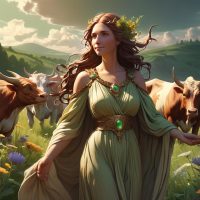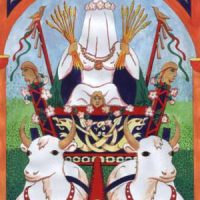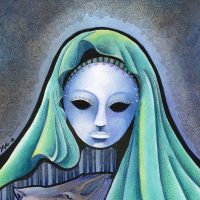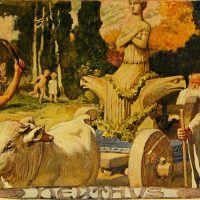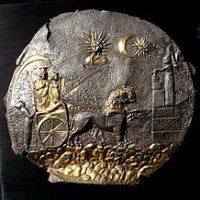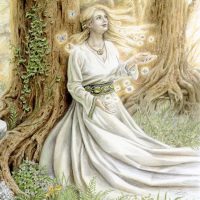Nerthus : The Fertility Goddess
Listen
At a glance
| Description | |
|---|---|
| Origin | Norse Mythology |
| Classification | Gods |
| Family Members | Njord (Husband) |
| Region | Iceland, Finland, Denmark, Norway |
| Associated With | Fertility, Abundance |
Nerthus
Introduction
Nerthus, a goddess from Norse mythology predating Christianity, holds a pivotal role as a symbol of fertility, nature, and the Earth. Revered by ancient Germanic tribes, as chronicled by Tacitus in his work “Germania” circa 100 CE, Nerthus captivates scholars and enthusiasts with her enigmatic presence. Veiled in mystery, she embodies the essence of life’s cycles and the nurturing forces of the earth. Known also as Nerth or HNerthus, this deity remains elusive in Norse mythology, receiving minimal attention compared to well-documented figures like Odin or Thor.
Physical Traits
Tacitus paints a vivid picture of Nerthus’ worship, describing a sacred grove on a remote island where a veiled chariot is housed. Only the priest may touch this chariot, believed to contain the goddess’s presence. Drawn by cows, it symbolizes Nerthus’s ties to fertility and the earth. While depictions of Nerthus in Norse mythology are rare, she is often associated with nature’s nurturing aspects, depicted with symbols like sheaves of wheat and flowers. Though her physical appearance remains a mystery due to scarce descriptions and no surviving statues, scholars speculate she might embody a maternal figure exuding warmth and abundance.
Family
The origin of Nerthus’ name hints at a link to the Vanir deities in Norse mythology. Notably, the Old Norse name for the god Njord mirrors what the Proto-Germanic name Nerthus would appear like in Old Norse. This has sparked theories suggesting a divine pairing between Nerthus and Njord, akin to the parallelism seen in the names of the Vanir deities Freyr and Freya. While some conjecture links Nerthus to Njord, the god of the sea, wealth, and fertility, this association remains speculative due to limited evidence. In Norse mythology, Nerthus is depicted as the sister of Njörðr, a deity associated with the sea and prosperity. This familial connection resonates with her role as a fertility goddess, as both Nerthus and Njörðr oversee crucial aspects of nature vital for sustaining life. Additionally, Nerthus is sometimes portrayed as the mother of Freyr and Freyja, twin deities embodying fertility, prosperity, and love. These familial ties underscore Nerthus’s significance within the divine pantheon and her profound influence over the natural world.
Other names
The name Nerthus carries a veil of mystery. Its etymology remains elusive, with theories suggesting ties to Old Norse words for “earth” (jörð) or “to nourish” (nara). Tacitus, in his writings, refers to her as “Mother Earth,” emphasizing her link to fertility. “Nerthus” is believed to be a Latinized rendition of her original Germanic name. Its etymological root, “Nerth,” possibly stems from a Proto-Germanic term denoting “strength” or “vitality.” Across Norse mythology, Nerthus goes by various names. Some texts simply label her as Njörðr’s sister, underscoring the enigmatic nature of her identity. Scholars draw parallels between Nerthus and other earth goddesses like Jörð, associated with Thor’s motherhood in certain tales. The name Nerthus itself might originate from *Nerþuz in Proto-Germanic, signifying “earth” or “mother nature,” reinforcing her deep connection to the land and its fecundity.
Powers and Abilities
Nerthus, revered as a fertility goddess in Norse mythology, holds profound influence over the natural world, particularly in matters concerning agriculture, abundance, and the perpetual cycles of existence. Through rituals and offerings, communities seek her blessings to ensure fruitful harvests and communal prosperity. Her affiliation with the earth symbolizes stability and continuity, embodying the enduring rhythms of life and death. Despite the scarcity of detailed accounts, Nerthus’s connection to the land endows her with a diverse range of powers and abilities, shaping her image as a nurturing and vital force in the divine pantheon.
Scholars speculate on Nerthus’s multifaceted powers, attributing to her roles beyond fertility. Some suggest she embodies peace and prosperity, with bountiful harvests often correlating with times of tranquility and abundance. Her association with the cyclical nature of existence hints at a deeper understanding of life’s rhythms, embracing both the inevitability of death and the promise of rebirth. Tacitus’s depiction of Nerthus’s sacred procession offers glimpses into her divine influence, where conflicts cease, and communities revel in unity and celebration, highlighting her potential to bring temporary peace and harmony.
The grandeur of Nerthus’s procession, as described by Tacitus, underscores her revered status among ancient Germanic tribes. The veiled statue of the goddess, drawn by cows across the land, symbolizes her benevolence and blessings bestowed upon the people. Ritual purification in a sacred lake signifies the renewal of the earth’s fertility, perpetuating the cycle of life and ensuring continued prosperity. Nerthus’s sacred rites not only ensure physical abundance but also evoke a sense of spiritual connectedness with the land, reinforcing her enduring legacy as a symbol of vitality and abundance in Norse mythology.
Modern Day Influence
Although historical records offer scant details on Nerthus’ mythology, her significance lies in her association with the fertility and prosperity of the land. The reverence accorded to her in early Germanic societies reflects a deep understanding of the natural environment’s importance in nurturing and sustaining life. Today, Nerthus serves as a poignant symbol of the sacred bond between humanity and the natural world, despite her limited presence in traditional Norse mythology.
Nerthus’s relevance extends into modern times, resonating with various movements and ideologies. Environmentalism: In an era marked by growing environmental concerns, Nerthus embodies the earth’s nurturing essence, appealing to those advocating for nature conservation and sustainable living practices. Feminist Theology: As a powerful female deity, Nerthus holds significance in feminist theological discourse, representing a reclamation of the feminine divine within religious traditions. Neopaganism: Contemporary pagans and followers of Norse reconstructionist movements integrate Nerthus into their spiritual practices, honoring her as an earth mother goddess and championing environmental stewardship.
Despite the enigmatic veil surrounding her in Norse mythology, Nerthus’s portrayal as the life-giving force of the earth underscores her enduring relevance. Her mystique invites further exploration and interpretation, particularly in a world grappling with environmental challenges and seeking deeper connections to the natural world. In modern Pagan and Heathen traditions, Nerthus remains a revered symbol of fertility, environmental harmony, and the interconnectedness of all living beings, perpetuating her legacy through rituals and ceremonies that honor the eternal cycle of life and renewal.
Related Images
Frequently Asked Questions
What is lorem Ipsum?
I am text block. Click edit button to change this text. Lorem ipsum dolor sit amet, consectetur adipiscing elit. Ut elit tellus, luctus nec ullamcorper mattis, pulvinar dapibus leo.
What is lorem Ipsum?
I am text block. Click edit button to change this text. Lorem ipsum dolor sit amet, consectetur adipiscing elit. Ut elit tellus, luctus nec ullamcorper mattis, pulvinar dapibus leo.
What is lorem Ipsum?
I am text block. Click edit button to change this text. Lorem ipsum dolor sit amet, consectetur adipiscing elit. Ut elit tellus, luctus nec ullamcorper mattis, pulvinar dapibus leo.
What is lorem Ipsum?
I am text block. Click edit button to change this text. Lorem ipsum dolor sit amet, consectetur adipiscing elit. Ut elit tellus, luctus nec ullamcorper mattis, pulvinar dapibus leo.
What is lorem Ipsum?
I am text block. Click edit button to change this text. Lorem ipsum dolor sit amet, consectetur adipiscing elit. Ut elit tellus, luctus nec ullamcorper mattis, pulvinar dapibus leo.

